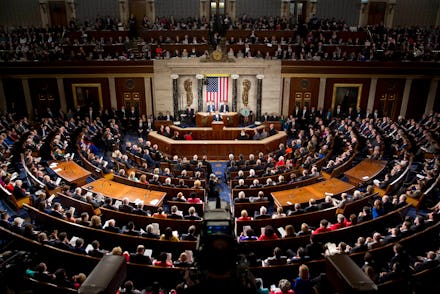An Astonishing Number of Americans Don't Know How Our Government Actually Works

Quiz many Americans on how the federal government works, and you might as well be asking them about rocket science. A recent poll of 1,416 adults from the Annenberg Public Policy Center of the University of Pennsylvania released Wednesday shows that a grave number of Americans show "great uncertainty" on "basic questions" about how their government functions — including stuff that any middle schooler, let alone a voter entrusted with electing the most powerful people on the planet, should know.
Here are some of the rather alarming statistics from the report:
While little more than a third of respondents (36%) could name all three branches of the U.S. government, just as many (35%) could not name a single one.
Americans are pretty pissed at Congress, with approval ratings remaining at record lows. But it looks like many of them don't quite know who they're mad at. More than half of the people polled weren't able to distinguish which political party controls the House and the Senate:
Asked which party has the most members in the House of Representatives, 38% said they knew the Republicans are the majority, but 17% responded the Democrats, and 44% reported that they did not know (up from 27% who said they did not know in 2011).
This might help explain why the American people are totally fed up with Congress but re-elect incumbents at fantastically high rates — a basic dearth of political literacy. Another recent poll by Johns Hopkins University researchers Jennifer Bachner and Benjamin Ginsberg found that everyday Americans are aware of their poor political comprehension, with just 30% saying people like them could understand U.S. politics.
Bachner and Ginsberg also found that policymakers were immensely skeptical about the public's ability to understand the issues, with over half saying the American public understood most major issues "very little" and almost none saying they had "quite a bit" or "a great deal" of knowledge on any given topic.
In one bright spot, a 2010 Pew poll did find that the public knew about big-picture issues like the balance of power in Washington — but also concluded that their answers got much hazier when they were asked for specifics. The people who knew the most tended to be older, whiter and male, which makes total sense when you consider who the people have been that wrote the Constitution and ran the U.S. for most of its ongoing history.
This is a bad situation to be in. On one hand, the actual government is run by a class of political elites who cater to the interests of the rich and have a low regard for the awareness of their constituents. On the other, many Americans don't have the political literacy necessary to push changes that would resolve their growing frustration and very legitimate grievances, like skyrocketing economic inequality, stagnating wages and a faltering economy. It's also possible that many Americans have simply stopped caring about the political process because they've lost faith in it.
The Simpsons' Mayor Quimby understood this dynamic years ago:
A certain brand of elitists love to use poll results like this to argue against mass participation in the electoral process because the public would taint democracy with its ignorance. But Americans participate in civic society in many ways beyond just voting, like serving in the military, working government jobs, getting involved in their communities and organizing around specific issues on state and local levels. Considering that just about 58% of the public turn out to vote in presidential elections and fewer do for state and local ones, the people actually casting votes may well be the best informed.
Finally, pointing to the perceived political ignorance of commoners is another way to try and minimize their involvement in the process — and thus access to actual political and economic power. So while making sure Americans know more about politics should be a major priority, motivating us all to do more about our growing disenfranchisement is just as important.